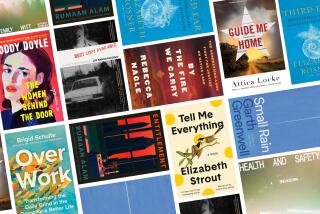BODY WATCH : Americans are spending less and less time reading books. But experts say weâd better start if we want want to keep ourselves . . . Intellectually Fit
Think you canât afford the time and energy to read books? Think again, because it may be that you canât afford not to.
Sure, you have lots of good excuses, just as you once did for not vigorously exercising. But reading books is no less crucial for your overall health than physical exercise.
And just as in physical exercise, occasional sprinting or non-aerobic workouts--like magazines--wonât do for reaping maximum health benefits.
âEvery single study shows that the single most important thing we can do for mental development is to regularly spend time with books,â says Anita Silvey, editor in chief of Horn Book Magazine, a trade publication in Boston. âFor children, itâs the single factor in how well they do in school and their future careers. For adults, itâs the way our minds stay fit and alive.â
*
According to a 1990 Gallup Poll, Americans are reading less overall than two decades ago; only 24% completed a book in the past week, down from 30% in 1975. Additionally, the number of adult Americans who admitted to having read no books during the past year doubled from 1978 to 1990, from 8% to 16%. In all, almost half said they read five or fewer books the year before, compared to 37% in 1978.
Itâs not that people donât want to read, the same poll revealed. A whopping 92% said they considered reading to be a good use of time. But time is one thing they just donât have, so they go for quick reads like magazines and newspapers.
But such media canât replace books in a true reading program, says Mary Purucker, adjunct professor in UCLAâs graduate school of education and information services. Nor can books on CD-ROM, she adds.
âReal books have a sensual being all of their own,â she says. âTheyâre lasting, beautiful and permanent. With the exception of researchers, there arenât too many people who go back to look at a 1962 issue of Time. But a lot of people will go back to read books published that year.â
Unlike magazines and newspapers--with their shorter articles, jumps from page to page and distractions of ads--books elicit a long-term and concentrated interaction between author and reader, Purucker says.
âBoth parties bring everything theyâve ever experienced, and together, youâre creating something entirely new. No one experiences one book the same way--itâs something thatâs yours alone, a whole new world. Itâs a mind-boggling experience and better than any virtual reality you could ever be in.
âThereâs nothing like the physical fact of a book to build and alter our minds in healthy ways,â she adds.
By not reading, we lose âa sort of psychic habit, a logic, a sense of complexity, an ability to spot contradictions and even falsity,â says Neil Postman, professor of communication arts at New York University and author of âAmusing Ourselves to Deathâ (Viking Penguin, 1986), a book that discusses the political, cultural and educational consequences of readingâs decline.
*
Books also provide advice for specific problems--like divorce or death--and help you realize that youâre not alone.
âI often recommend particular books to patients,â says Michigan State University psychologist Gershen Kaufman.
And sometimes the best way to deal with oneâs problems is simply to get away from them for a while, thereby giving new perspective.
âFor some people, reading books in general works as a way of detaching, unwinding and unhooking from problems and stress,â Kaufman says.
Silvey agrees: âIt gives us time and distance to work through emotional times in our lives. And itâs hard to find a bigot whoâs a real reader. Books open up other lives and other points of view in a way that makes a person much more empathetic.â
No less significant than losing intellectual and problem-solving abilities from not reading is the loss of a simple pleasure: the relaxation to be found at the end of a manic day.
A book, Silvey says, âgives everyone fresh energy in a fast-paced world.â
A book, says a Chinese proverb, is like a âgarden carried in the pocket.â
A book, said Ezra Pound, âshould be a ball of light in oneâs hand.â
âA lot of people argue that reading books is a form of self-improvement,â says Howard Tinsley, a professor of psychology at Southern Illinois University who studies leisure activities, including reading. âAlthough books do offer opportunities for self-enhancement, thatâs not why people pursue it as a leisure activity. They read to feel relieved of the demand to be conscientious.â
And sharing books with others, by reading aloud or joining book reading groups, creates an emotional and cultural bond, experts agree. Reading can also evoke warm memories.
âWhenever I read certain books, I can see my grandmotherâs face and remember sitting in her lap,â says Silvey, wistfully.
*
So whatâs a busy person to do?
Make time for books, experts say, even if itâs only 20 minutes a night, less than one episode of âHome Improvement.â
âUnless we do something soon, our culture will go into a free fall,â says Rosemary Wells, a New York author who last year spearheaded a national campaign to make reading the âmost important 20 minutes of your day.â
âOnly a tectonic plate shift back to reading is going to reverse this trend,â she writes. âWe now have an enormously successful fitness industry, with everything from yogurt stands to running shoes. . . . Together booksellers, library organizations and publishers must scare the public into paying attention the same way the fitness and anti-tobacconists did.â
Adds Wells: âBy reversing some of the mindlessness of electronic video culture, we can reinvigorate the American spirit.â
More to Read
Sign up for our Book Club newsletter
Get the latest news, events and more from the Los Angeles Times Book Club, and help us get L.A. reading and talking.
You may occasionally receive promotional content from the Los Angeles Times.








